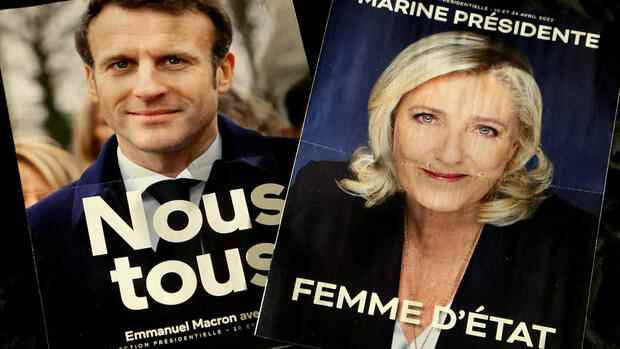The incumbent president and the right-wing populist are likely to make it into the runoff in the first round on Sunday.
(Photo: action press)
Paris The first round of the presidential elections began in France on Sunday. The polling stations opened at 8 a.m. Around 48.7 million voters had registered to cast their vote.
Shortly before the official end of the election campaign in France, Emmanuel Macron tried to mobilize his supporters with a series of interviews. “My mood is more one of victory than defeat,” Macron said during one of his media appearances on Friday. The president has to fight, in polls the gap to right-wing populist Marine Le Pen has recently shrunk.
Since the night from Friday to Saturday there has been silence in France’s politics. Campaign rules prohibit candidates from campaigning for votes until the first results are released on Sunday night. The first polling stations in French overseas territories already opened on Saturday, and citizens in the mother country have been going to the polls since Sunday morning.
The first round of the presidential election decides which two candidates will move into the runoff two weeks later. In recent polls, Macron was at the top with 25 to 27 percent, followed by Le Pen with 22 to 24 percent. Pollsters put left-wing populist Jean-Luc Mélenchon in third place with values of 16 to 18 percent.
Top jobs of the day
Find the best jobs now and
be notified by email.
As in the election five years ago, a runoff between Macron and Le Pen is the most likely variant – even if Mélenchon is given outsider chances should the fragmented left camp gather behind him in the last meters. According to the polls, a duel between Macron and Le Pen could be much closer this time: some polls only saw a lead for the president of four to five points. In 2017, Macron won 66 to 34 percent.
The President was late in the election campaign. He justified his reluctance with the war in Ukraine, which required his full attention as head of state. Since his official candidacy in early March, he has only completed one large rally in front of around 30,000 supporters last weekend in Paris and five campaign trips around the country.
>> Read also: These candidates are running in the French elections
“It’s true, I started the campaign much later than I wanted,” Macron said in one of his last interviews before the standstill period. The president tried all the harder to attack his central challenger in the final phase of the election campaign. “Marine Le Pen lies to people,” he told Le Parisien newspaper.
The right-wing populist did not submit any serious financial proposals for her socio-political promises. Macron also accused her of being close to Russian President Vladimir Putin, on whom she was “financially dependent”. A few years ago, Le Pen’s Rassemblement National party, then called Front National, obtained a million-euro loan from a Russian bank.
>> Read also the interview with Axa boss Thomas Buberl: “With Le Pen, a phase of uncertainty would begin”
By changing the name, Le Pen tried to give the party a more moderate image. She deleted radical demands such as France’s exit from the euro. She also weakened her choice of words on the subject of migration. In the current election campaign, she mainly talked about purchasing power and the concerns of the French about rising prices.
Almost a third of French undecided
“People think that she is a woman who represents a socialist economic program,” Macron said of his opponent. But the focus of the Rassemblement National has not changed. “Le Pen wants to divide our country,” he said.
The outcome of the election in France is also difficult to predict because people’s ties to parties have waned. The traditional political forces of the center left and right, the Socialists and the conservative-bourgeois Republicans, play virtually no role anymore. This development was also evident in the election five years ago, when Macron immediately moved into the Élysée Palace with his new center party “La République en Marche”.
A big question is how many French people stay away from the polls. Polling institutes estimated that up to 30 percent of the electorate could not take part in the vote. In addition, three out of ten French did not know who they would vote for shortly before the election. There will be answers tonight after the last polling stations close at 8 p.m.
More: This is how France ticks before the election – and that’s why things could get tight for Macron
